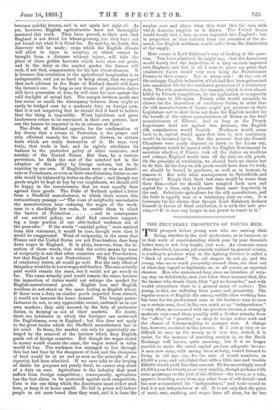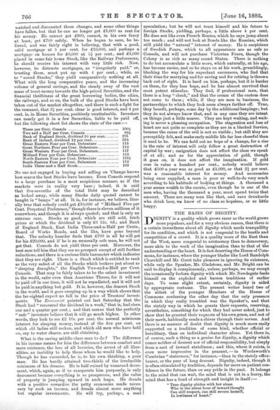THEPECUNIARY PROSPECTS OF YOUNG MEN.
THE prospect before young men who are earning their living, whether in the civil professions, or in business, or in that work of superintending which year by year demands better men, is not very bright, just now. An economic cause often described, but even yet scarcely realised by general society, is tending to produce what in the fighting Services is called a " block of promotion." The old stagers do not go, and the young, who see so much prosperity around them, are shut out of what they regard as legitimate, or, at all events, as expected_ chances. Men who announced long since an intention of retir- ing stay on indefinitely, men just below them murmur that, lika the farmer who drank claret, they " get no forrarder," and with wealth everywhere there is a general sense of malaise. The young, in fact, are suffering from peace and prosperity. The regular course of English life among middle-class working bees has been for the professional man or the business man to save up a certain sum, fixed in his own mind, as an " independence " —very often, as compared with his previous income, a strangely moderate sum—and then, possibly with a further annuity from the " office," or " practice," or shop, to resign active work and • the chance of fortune-making to younger men. A change has, however, occurred in this process. It is just as easy or as difficult to save up the money as it ever was, indeed, it is easier, for the increase of investing caution is, as the Stock Exchange well knows, quite amazing ; but it is no longer possible to make the saved capital produce adequate income. A man now sixty, with saving ideas at forty, looked forward to living in old age, say, for the sake of round numbers, on £1,000 a year, and calculated that with a little care and trouble £20,000 would yield him that amount. He has accordingly saved £1,000 a year for twenty years very steadily, though perhaps with some grosnings on the part of his children—the wives, as a rule,, approve hoarding more than any other form of self-denial—and has now accumulated his " independence," and looks round to, find it is not independence at all. It is not only that the price of meat, rent, washing, and wages have all risen, for he has watched and discounted those changes, and some other things have fallen, but that he can no longer get £1,000 as rent for his money. He cannot get £800, cannot, in his own fancy at least, get £700 safely. When he began to save, he be- lieved, and was fairly right in believing, that with a good, solid mortgage at 5 per cent. for £10,000, and perhaps a mortgage on houses for £6,000 at 51 per cent., and £4,000 placed in some fair home Stock, like the Railway Preferences, he should receive his interest with very little risk. Now, however, he distrusts mortgages, as "irregularly paid," or, trusting them, must put up with 4 per cent. ; while, as to " sound Stocks," they yield comparatively nothing at all. What with the long comparative peace, and the increasing volume of general savings, and the steady sway of the vast mass of trust-money towards the high-priced Securities, and the financial thriftiness of the great borrowing bodies, the cities, the railways, and so on, the bulk of the good Stocks have been taken out of the market altogether, and there is such a fight for the remnant, that 31 per cent. clear is good interest, and 4 per cent. is, in Home Securities, positively unattainable. Investors can nearly get it in a few Securities, liable to be paid off, but the following short list shows the state of the case:— Three per Cent. Consols
100} Two and a Half per Cent. Consols 88} Bank of England Stock, dividend 10 per cent 295 Bank of Ireland, dividend 12 per cent. 324 Great Eastern Four per Cent. Debenture 113 Great Northern Four per Cent. Debenture 116 Great Western Four per Cent. Debenture 117 Midland Four per Cent. Debenture 116 North-Eastern Four per Cent. Debenture 115} South-Eastern Four per Cent. Debenture 112 India Three and a Half Stock
103
No one not engaged in buying and selling on 'Change knows how scarce the best Stocks have become. Even Consols respond to a large purchase in a most suspicious manner, as if the markets were in reality very bare ; indeed, it is said that five-sevenths of the total Debt may be described as locked away, while many Stocks daily quoted cannot be bought in "lumps " at all. It is, for instance, we believe, liter- ally true that nobody could get £10,000 of " Midland Five per Gent. Perpetual Preference," though there is eleven millions of it somewhere, and though it is always quoted; and that is only an extreme case. Stocks as good, which are still sold, fetch prices at which the dividend is only £3 12s. 6d.; and Bank of England Stock, East India Three-and-a-Half per Cents., Board of Works Bonds, and the like, have gone beyond that. The unlucky hoarder finds that £700 is all he will get for his £20,000, and if he is an unusually safe man, he will not get that. Consols do not yield three per cent. Moreover, the best men tell him that they see no prospect except of still further reductions, and there is a curious little barometer which indicates that they are right. There is a Stock which is entitled to rank as the very safest of all the Stocks which brokers jest about as "sleeping draughts," the English Two-and-a-Half per Cent. Consols. That may be fairly taken to be the safest investment in the world, safer even than American Threes, for it will not be paid off in our time, it will not be repudiated, and it will not be paid in anything but gold. It is, however, the dearest Stock in the world, and it goes creeping up in a way which shows that the far-sighted expect no fall in the price of Trustees' invest- ments. The Economist pointed out last Saturday that the Stock had " recovered the dividend in a week," that is, had risen one and a quarter per cent. ; and that means that the perfectly " safe " investors believe that it will go much higher. In other words, they look to see £2 10s. per cent. the normal minimum interest for sleeping money, instead of the five per cent. on which old ladies still reckon, and which old men who have held on, say to water shares, are still obtaining.
What is the saving middle-class man to do P The difference in his income means for him the difference between comfort and mere existence, the loss of all luxuries, the arrest of all liber- alities, an inability to help those whom he would like to help. Though he has succeeded, he is, to his own thinking, a poor man. He has hardly attained two-thirds of the irreducible minimum of his dreams. He is half. ruined by unearned decre- ment, which, again, as if- to exasperate him purposely, is only decrement because everything is so prosperous, and the value of property is jumping upward in such leaps. He dreads with a positive cowardice the petty economies made neces- sary by such an income, and dreads almost more anything but regular investments. He will try, perhaps, a mad speculation; but he will not trust himself and his future to foreign Stocks, yielding, perhaps, a little above 4 per cent. He does not like even French Rentes, which he says jump about too much ; and will not look at Bonds like the Russian, which still yield the " natural " interest of money. He is suspicious of Swedish Fours, which to all appearance are as safe as Consols, and will not purchase Victorian Fours, though the Colony is as rich as many sound States. There is nothing to do but accumulate a little more, which naturally, at his age, has become easier, and so he stays on at his work, grumblingly, blocking the way for his expectant successors, who find that their time for marrying and for saving and for retiring is thrown back out of sight. It is hard on him, perhaps, but it is harder on them, for they lose hope, and he has almost survived that most potent stimulus. They find, if professional men, that there is a long " check," and that the cream of the custom does not come to them ; while, if they are men in business, the partnerships to which they look seem always further off. True, they benefit, perhaps, some day by the additional heapings ; but they do not always know that, and in any case they are intent on things just a little nearer. They are kept waiting, and wait- ing is never a pleasing occupation. The stagnation and loss of heart are not quite so complete as they are in a blocked Service, because the cause of the evil is not so visible ; but still they are perceptibly felt, and make early middle life far less cheerful than it used to be. We can hold out no hope of a change, for a rise in the rate of interest will only follow a great destruction of capital by war ; emigration does not affect the class we speak of at all ; and as for the appreciation of gold, though it goes on, it does not affect the imagination. If gold rose in value a hundred per cent., nobody would believe that £500 a year was as good as £1,000, or that per cent. was a reasonable interest for money. And necessaries being once supplied, a man is poor or well-to-do very much according to his habitude of looking at things. A thousand a year seems wealth to the curate, even though he is one of the men who, having the thousand a year, must spend twice that amount. There are many men like that, and save drunkards who drink beer, we know of no class so hopeless, or so little happy.



































 Previous page
Previous page